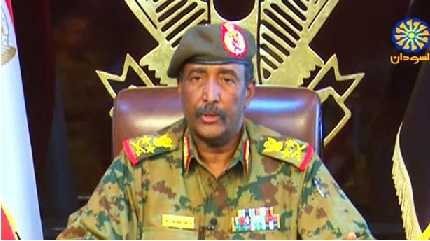
06 July 2022; MEMO: The Commander-in-Chief of Sudan's army, Abdel Fattah Al-Burhan, dismissed the five civilian members of the country's Sovereignty Council on Tuesday. Well-informed sources in the council confirmed to Al-Quds Al-Arabi that the civilian members received an official letter relieving them of their duties.
About two weeks after Al-Burhan's coup against the transitional government last year, it was announced that a new Sovereignty Council was being formed. It consisted of five military members, representatives of the three armed militias, and the consensual civilian member Raja Nicola — all of whom were members of the council from the beginning of the transitional phase — in addition to four other civilian members.
On Monday, Al-Burhan announced that the Sovereignty Council would be dissolved and replaced by a Supreme Council of the Armed Forces. "The new council will assume the supreme command of the regular forces and be responsible for security and defence tasks in agreement with the government that is being formed," he explained.
The general also announced that the military establishment will not participate in the national dialogue under the auspices of the "tripartite mechanism". The army's withdrawal from the dialogue, he said, makes room for the political and revolutionary forces and national components to form an independent national competency government that will complete the requirements of the transitional period.
READ: Sudan won't get elected national government through protests, says chief of staff
The direct dialogue was launched in Khartoum on 8 June under the auspices of the African Union to end the political crisis in the country. On 12 June, the tripartite mechanism announced the postponement of the second round of dialogue to a date to be determined later.
Sudan has witnessed popular protests since 25 October last year calling for the return of democratic civilian rule and rejecting the exceptional measures taken by Al-Burhan, who was then the head of the Sovereignty Council. Opposition groups describe the measures as a "military coup".
Al-Burhan has denied the accusation. The measures, he insisted, are aimed at "correcting the course of the transitional phase," and he pledged to hand over power through elections or a national consensus.




